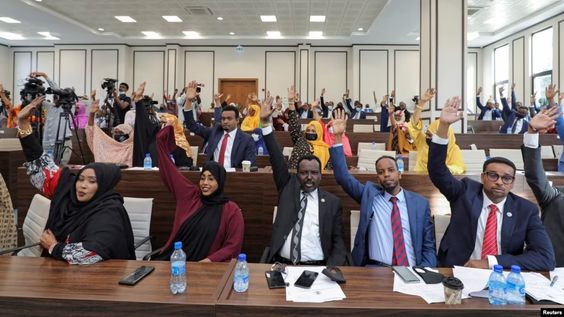Africa
Lower House of Somalia passes a landmark anti-terrorism law

A new anti-terrorism law that intends to create a legal framework to aid government security forces in better combating and eradicating terrorism in Somalia was passed by the lower house of the country’s parliament on Wednesday.
After weeks of discussion, lawmakers passed the bill 133-3, with 7 abstentions, in what Somalia’s director of intelligence, Mahad Mohamed Salad, called an essential law to keep the Horn of Africa nation safer.
“This law is essential for our fight against terrorism, and it comes at a time when we most need it to carry out our national duty in avoiding terror actions and destroying terrorism,” declared Salad.
“Today, a measure that would protect women and children from terrorist attacks and be a sharp sword for government security forces to exterminate the terrorists have successfully passed this house,” said Abdiladif Sanyare, a Somali member who backed the bill.
The legislation’s wide definition of what constitutes terrorism worries its opponents, who warn that its ratification might give government security services disproportionate and unrestrained power.
One of the legislators that voiced concerns about the proposed legislation during deliberations is Hassan Abdi Isma’il.
“We do not know who may come to power in the future, [and] since this is a national law, we do not want it to damage innocent persons,” he added, adding that “even if today’s president and prime minister have good intentions.”
The five-time survivor of al-Shabab terror attacks and Somali journalist-turned-lawmaker Mohamed Ibrahim Moalimuu said the new bill shouldn’t allow government agents to undertake quick arrests of suspects without warrants.
This measure, according to Moalimuu, “gives the security agencies [permission] to raid and arrest terrorist suspects without court orders.” This is against our constitution. “Thus, there should be no constitutional issue with this bill.”
However MP Mahdi Mohamed Guled, a former deputy prime minister of Somalia, claims that the draught was changed during the debates to include a precise definition of terrorism.
“This law’s definition is unambiguous, and it targets recognised terrorist organisations and groups. Guled promised that it wouldn’t be applied for political ends.
The second of two crucial bills
The lower house’s ratification of this bill comes while Somalia is engaged in a bloody conflict with al-Shabab, the organization’s most dangerous and potent affiliate in east Africa.
The bill will be sent to the Parliament’s upper house for one more round of approval in accordance with Somali law. If it is approved, President Hassan Sheikh Mohamud would then sign it into law.
In just a few months, the Parliament of Somalia has approved a second significant bill.
Some 53 years after the country formed its first intelligence agency, the lower and upper houses of Somalia’s Parliament formally supported the bill establishing the National Intelligence and Security Agency of Somalia, or NISA, early last month. The president is currently waiting to sign the bill in his office.
READ ALSO: Russian oligarch-linked firm made a sizable donation to the ANC in South Africa
Human Rights Watch requested that President Mohamud refuse to approve a law that they claim will give the nation’s oppressive spy agency more authority.
The National Security and Intelligence Agency (NISA) will have broad powers of arrest, detention, and surveillance under the draught law that the Senate approved on February 22, 2023, according to the U.S.-based organisation, which also claims that NISA will have only minimal oversight over other security agencies.
NISA representatives did not return calls from VOA seeking a reaction to the criticism. The organisation, which seldom interacts directly with media outlets, frequently releases comments in which it emphatically denies wrongdoing or human rights violations, as well as remarks endorsing anti-al-Shabab operations nationwide.
Militants were killed.
Officials said on Wednesday that 13 al-Shabab terrorists who had been found guilty of killing government employees and committing terrorist acts in the Puntland area of northeastern Somalia had been put to death by firing squad in three different towns there.
According to Abdifitah Haji Adam, the chair of the Puntland military court, the suspects were found guilty and given death sentences between 2017 and 2022.
The males, according to Adam, were al-Shabab members. “The men were found guilty of participating in terrorist attacks and killing people, including pregnant women and children, as well as government officials and security personnel.”
The court also executed five Puntland soldiers for killing other soldiers and civilians in addition to the al-Shabab militants.
“Three Puntland soldiers and seven al-Shabab fighters were killed in Bossaso. Two soldiers were executed in Qardho, Adam claimed. “Five al-Shabab terrorists were killed in Galkayo and one al-Shabab member was killed in Garowe.”
Some of al-top Shabab’s leaders were killed in U.S. drone strikes, which reduced the organization’s military might in southern and central Somalia and drove some of its militants to move north to establish strongholds in the hilly regions of Puntland.
The gang is shown greater resiliency than anticipated by continuing to conduct frequent suicide attacks and assaults on Somalia’s hotels and military objectives.
The terrorist group has killed dozens of government officials in Puntland in recent years, including the director of the Presidential Palace, AbdiKarim Hasan Fidiye, third deputy commander of the Puntland Police Forces, and the solicitor general of the Puntland Military Courts.
VOA
